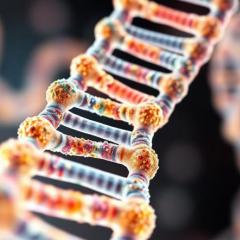A University of Queensland spin-off company is about to start clinical trials that could result in the prevention and treatment of genital herpes, a virus that affects hundreds of thousands of people, threatens newborn babies and is believed to contribute to the development of HIV.
Coridon Pty Ltd will soon start a Phase I HSV-2 vaccine clinical trial in Brisbane.
Professor Ian Frazer AC, who said the new technology could eventually prevent and cure the herpes simplex virus (HSV-2), and could also lead to other effective vaccinations for incurable diseases such as HIV/AIDS and hepatitis C.
Professor Frazer, CEO and Director of Research at Brisbane's Translational Research Institute (TRI) and lead researcher at The University of Queensland Diamantina Institute (UQDI) is leading development of the vaccine. The World Health Organisation (WHO) estimates more than half a billion people aged 15–49 years are living with HSV-2 worldwide.
“HSV-2 genital herpes affects up to one in eight Australians, and there is currently no curative treatment,” Professor Frazer said.
“The vaccine technology offers the potential of being both a preventative and therapeutic vaccine.
The vaccine will be injected into the forearms of 20 healthy volunteers in a trial designed to demonstrate its safety and how well it is tolerated, and to determine the effective dose and show that it generates a robust immune response.
Professor Frazer said HSV-2 was the major cause of genital herpes.
“The virus causes pain and discomfort, and can have serious health implications for babies born to infected women,”
“Herpes is also believed to aid in the transmission of HIV.
“Current herpes treatment involves the use of antiviral drugs which can reduce, but not eliminate, outbreaks and shedding but do not prevent spread of the disease.
“This is the beginning of an exciting period for our herpes vaccine,” he said.
“We have seen very encouraging results from animal studies and we expect pivotal data showing that our vaccine, which incorporates our patented optimisation technology, to produce similar immune responses in the clinic.”
The Phase I clinical trial will be undertaken through Q-Pharm Pty Ltd's clinical trial site at the Royal Brisbane and Women's Hospital.
Coridon is seeking healthy male and female volunteers, aged 18-45 years and who have never had a cold sore, to participate in the trial.
Those interested in participating should contact Q-Pharm on 1300 774 276, email volunteers@qpharm.com.au or visit www.qpharm.com.au for details.
Media:
The University of Queensland Diamantina Institute Marketing and Communications Manager:
Caroline Davy, (07) 3443 7027, c.davy@uq.edu.au;
Coridon CEO: Neil Finlayson, (07) 3443 6996, neil.finlayson@coridon.com
About Coridon
Coridon was founded in 2000 by Professor Ian Frazer as a private unlisted company, to develop and commercialise patented technology for improving immune responses to DNA vaccines licensed by UniQuest Pty Ltd and developed at the University of Queensland. The company has laboratories within Translational Research Institute, located on the Princess Alexandra Hospital campus in Brisbane, working in collaboration with the University of Queensland's Diamantina Institute. The company's overall objective is to utilise its unique optimisation technology to produce prophylactic and/or therapeutic DNA vaccines for a range of infectious diseases and cancers in humans. Product development is currently focused on herpes virus vaccines.



